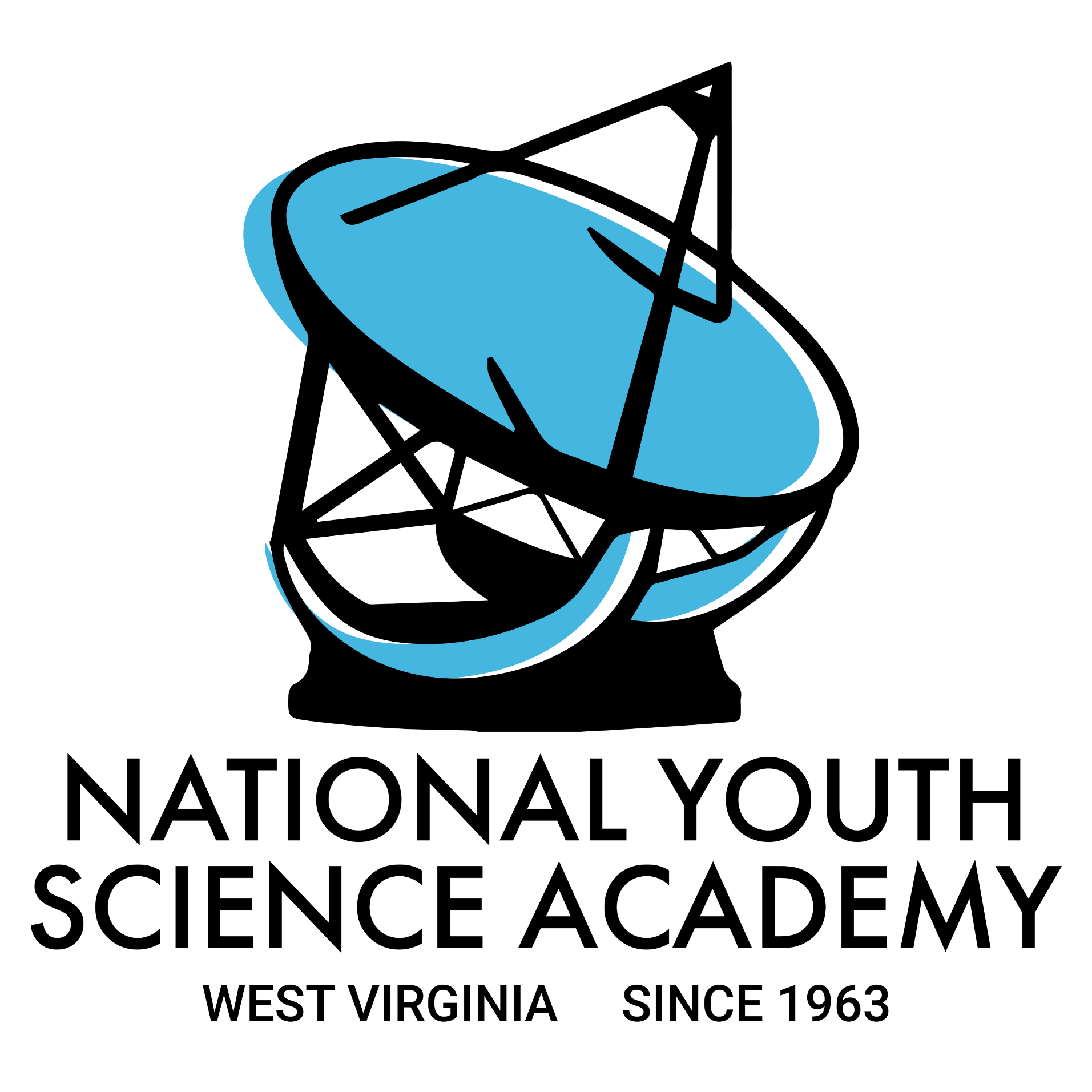Important Links
- Master Plan – National Center for Youth Science Education
- STEM Education Center
- NYSF Mission Statement
- Article in the Charleston Gazette – December 14, 2014
- Article in the Charleston Gazette-Mail – December 20, 2014
- Editorial in the Charleston Gazette-Mail – December 27, 2014
- West Virginia Council on STEM – Report to the Governor
- Letters of Support
National Center for Youth Science Education
In the 1980s, the National Youth Science Foundation (NYSF) committed to a bold plan to construct a National Center for Youth Science Education (NCYSE). The NCYSE will allow the NYSF to expand and improve its programs and become a focal point that encourages and inspires youth to pursue education and careers in science, technology, engineering, and mathematics (STEM).
In 2009, after a decade-long search, the NYSF purchased 111 acres alongside the Blackwater River near Davis from the Canaan Valley Institute (CVI) to serve as the future home of the NCYSE. This purchase agreement included assurances from CVI that the NYSF would have first-right of use of CVI facilities in the event that they became available and required important action by the NYSF set forth below. This agreement was a key facet in planning the future facility.
In 2010 the NYSF published its NCYSE Master Plan that called for the construction of critical spaces in support of the NYSF’s flagship program, the National Youth Science Camp (NYSC) and other, new STEM-focused programs. See http://masterplan.nysf.com to review this master plan.
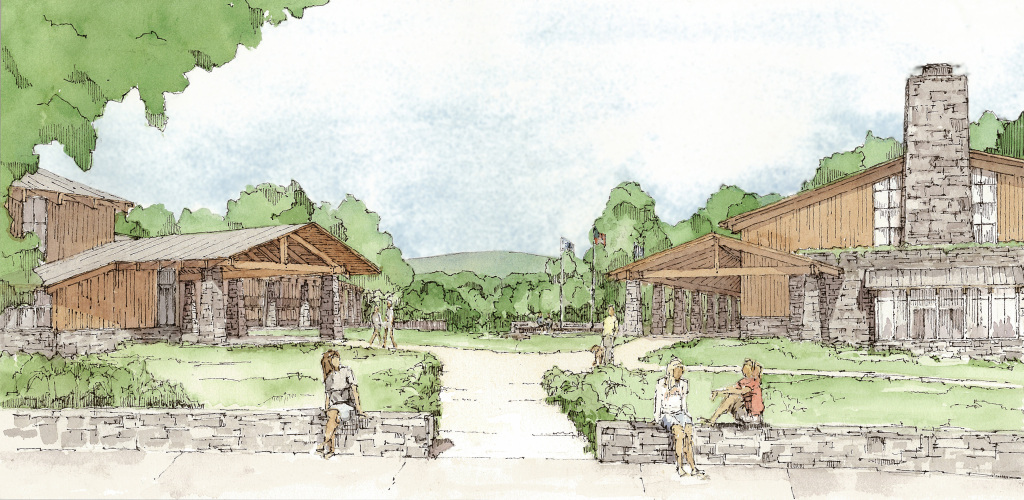
Disposition of the CVI Facilities
In 2009, with funding from the National Oceanographic and Atmospheric Administration (NOAA), CVI completed construction of two buildings: the Research and Education Center and the Research Support Building.
Recently, CVI advised NOAA that financial pressure and limited business options required CVI to be relieved of its responsibilities in operating and maintaining these buildings and property. Based on the standing agreement with CVI, the NYSF immediately petitioned NOAA requesting that the NYSF be selected as the steward of this important education facility so that the NYSF could advance its plans to develop STEM education programs as a critical step towards the National Center for Youth Science Education.
While NOAA acknowledged in 2009 the NYSF’s right to use by virtue of its agreement with CVI, NOAA has provided the United States Fish and Wildlife Service the first opportunity to the CVI facilities.
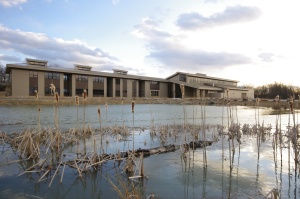
STEM Education Center
Consistent with the NYSF’s long-term objective to develop the NCYSE on its property adjacent to CVI, the NYSF would transform CVI’s research and education facilities into the STEM Education Center. Located within a ten-minute walk from the NYSF’s planned NCYSE, the STEM Education Center would accelerate the NYSF’s move to Tucker County and permit the NYSF to operate STEM education programs there as soon as 2016.
Programs and Plans
According to data from the National Center for Education Statistics (NCES) and the National Assessment of Educational Progress (NAEP), science and mathematics education achievement in West Virginia continues to lag far behind that of the nation as a whole. In grade 8, students in West Virginia scored lower than those in 44 states in mathematics and lower than 29 states in science.
According to Change the Equation (CTEq), a nonprofit organization dedicated to improving teaching and learning in STEM, West Virginia must raise the acceptable achievement standards in mathematics and science, improve teacher preparation and support, and expand participation in rigorous courses in mathematics and science. Through its flagship National Youth Science Camp program and other innovative STEM experiences, the STEM Education Center would serve thousands of students each year.
The NYSF has extensive experience in operating STEM education programs in West Virginia, including:
- National Youth Science Camp (1963 to present)
- WV Governor’s School for Math & Science (2005 through 2014)
- WV Youth Science Camp (1994 and 1995; 2011 to present)
- Youth Science Discovery Experience (2010 through 2014)
- Youth Science Leadership Institute (2002 and 2006)
- Community Science Seminar (2002 and 2003)
Over its more than 50-year history, approximately 6,000 students have participated in NYSF programs, including:
- Marissa Mayer (Wisconsin 1993) – President and CEO of Yahoo!
- Wes Bush (West Virginia 1979) – CEO and President Northrop Grumman Corporation
- David Thompson (South Carolina 1972) – Chairman, President, and CEO of Orbital Sciences
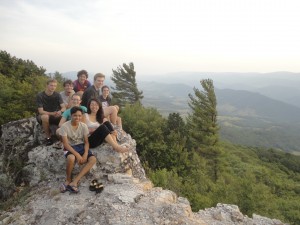
The NYSF expects to develop financial support through public and private initiatives to complete the necessary improvements at CVI and the NCYSE. The NYSF expects that the STEM Education Center would be recognized as a Regional Network Hub in the West Virginia STEM Network as proposed by the Governor’s STEM Council and endorsed by West Virginia’s State Superintendent of Schools, Dr. Michael Martirano.
According to the Governor’s STEM Council Report, “The goal of a HUB is to amplify and accelerate the impact of existing STEM programs within a particular region. It is designed to support STEM programs and schools, increase the ability of existing STEM assets to generate regional impact, grow linkages between and support of existing STEM assets in a region, identify gaps in the system, and connect other STEM initiatives to that region’s STEM efforts.”
Youth Science Discovery Experience
Initiated in 2010 with financial support from the National Aeronautics and Space Administration (NASA), the Youth Science Discovery Experience (YSDE) is a STEM project based learning (PBL) program. Proven to enrich and complement traditional education, the YSDE bridges the gap between the classroom and the professional laboratory. the YSDE teams small groups of students with STEM professionals in an engaging and creative environment where students are free to explore and learn with expert guidance.
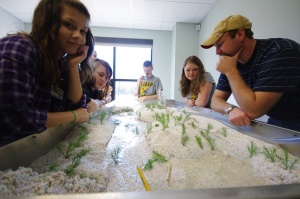
While in residence at the STEM Education Center, YSDE students would conduct research in STEM fields guided by mentoring professionals. Research topics vary and have recently included biology, clean-coal technology, energy management, engineering, forestry, hydrology, and physiology.
At the conclusion of each ten-day session of the YSDE, research teams present their findings to peers, faculty, staff, and guests in an academic colloquium that reinforces the need for ongoing research and exploration. Teams keep online research logs and present their results in posters on the YSDE website. The primary research focus of the YSDE is complemented with guest lectures, whole-group problem-solving activities, and informal seminars. The YSDE also leverages local scenic areas for outdoor adventure activities, including mountain biking, snowshoeing, hiking, and camping.
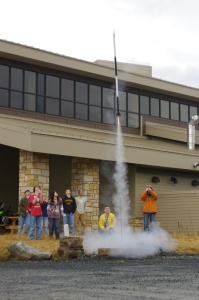
With full access to the CVI facilities, the NYSF would expand the YSDE to serve 21 cohorts of 40 students each allowing 840 West Virginia students annually to participate in this exciting STEM education program. Operating a program of this magnitude requires public support and funding. In 2014, the State Superintendent of Schools, included a request to support the YSDE in the West Virginia Department of Education’s budget proposal. While it was not funded, there is recognition that the YSDE can provide valuable assistance to the State of West Virginia as they work to meet important and national standards in science and mathematics education.
Economic Impact
The NYSF envisions two stages of development in Tucker County.
Stage One Milestones (completed by 2016)
CVI facilities would be transformed into the STEM Education Center and enhanced to annually support the National Youth Science Camp, one or two other summer programs, and additional activities throughout the year.
- Securing sufficient funds (approximately $2,000,000) to complete renovations and and construction.
- Construction of robust, temporary, seasonal housing (capacity 200).
- Renovating or constructing sufficient sanitary services.
- Enhancing food service capability to provide 200 meals, 3 times per day.
- Reconfiguring CVI office space to provide education space during the summer and indoor housing for as many as 40 students during the winter.
- Designating the STEM Education Center as a Hub in the West Virginia STEM Network as proposed by the Governor’s STEM Council.
Impact of Stage One
- Annually serve approximately 1,000 students.
- Create 40 seasonal jobs.
- Create 10 to 20 year-round jobs ranging from the service sector (food service, maintenance, etc.) to professional. Some of these positions would be filled by current Tucker County residents.
Stage Two Milestones (2016 – 2020)
Remaining facilities would be constructed.
- Securing sufficient funds (approximately $30,000,000) to complete NCYSE improvements and construction of facilities.
- Extending utilities to the NYSF property on the south side of the Blackwater River.
- Construction of permanent, four season facilities including the dining hall; student, staff, and guest housing; and other improvements identified in the NCYSE Master Plan (http://masterplan.nysf.com).
Impact of Stage Two
- Annually serve as many as 3,500 students.
- Sustain 40 seasonal jobs and create 10 to 20 new year-round jobs.
Multiplier
NYSF facilities and programs will have a lasting and expanding positive economic impact on the Tucker County community. The NYSF has operated sessions of the Youth Science Discovery Experience at the Canaan Valley Institute. As the NYSF’s presence grows, so will the economic impact – both through employment opportunities and services.
Potential Adverse Consequences
If the NYSF is not allowed full access to the CVI facilities:
- Development of the NCYSE will be significantly delayed and potentially jeopardized.
- It will be necessary to fully fund, develop, and construct the NCYSE before moving NYSF programs to Tucker County.
- Concerns remain over potential access to utility extensions (currently available on CVI property) as well as access to NYSF property via CVI roads that connect to WV Route 93 (Corridor H).
Important Contact Information
Tucker County Commission
http://www.tuckercountycommission.com
211 First Street, Suite 307, Parsons, WV 26287
(304) 478-2866 ext. 207; Fax (304) 478-2446
E-mail: Joel Goughnour, tuckergwa@gmail.com
Dr. Kathyrn D. Sullivan
Administrator, National Oceanographic and Atmospheric Administration
Under Secretary of Commerce for Oceans and Atmosphere
National Oceanic and Atmospheric Administration
1401 Constitution Avenue, NW, Room 5128, Washington, DC 20230
Twitter: @NOAA
Mr. Edward C. Horton
Chief Administrative Officer
National Oceanographic and Atmospheric Administration
1305 East West Highway, Silver Spring, MD 20910
Secretary Sally Jewell
United States Department of the Interior
1849 C Street NW, Washington, DC 20240
Twitter: @SecretaryJewell
Honorable Jay Rockefeller
United States Senate
531 Hart Senate Office Building, Washington, DC 20510
(202) 224-6472; Fax (202) 224-7665
http://www.rockefeller.senate.gov/public/
Honorable Joe Manchin III
United States Senate
306 Hart Senate Office Building, Washington, DC 20510
(202) 224-3954; Fax (202) 228-0002
http://www.manchin.senate.gov/public/
Honorable Shelly Moore Capito
United States House of Representatives
2366 Rayburn H.O.B., Washington, DC 20515
(202) 225-2711; Fax (202) 225-7856
http://capito.house.gov
Honorable David McKinley
United States House of Representatives
412 Cannon H.O.B., Washington, DC 20515
(202) 225-4172; Fax (202) 225-7564
http://mckinley.house.gov
Honorable Earl Ray Tomblin
Office of the Governor of West Virginia
1900 Kanawha Boulevard, East, Charleston, WV 25305
(304) 558-2000 or (888) 438-2731
http://www.governor.wv.gov/
Dr. Michael J. Martirano
State Superintendent of Schools
1900 Kanawha Boulevard, East, Charleston, WV 25305
(304) 558-2681
superintendent@wvde.state.wv.us
http://wvde.state.wv.us/superintendent
Twitter: @mjmsuper
Ronald G. Pearson
Chairman, Board of Trustees
National Youth Science Foundation
P.O. Box 1065, Charleston, WV 25324
Dr. Andrew N. Blackwood
Executive Director, National Youth Science Foundation
P.O. Box 3387, Charleston, WV 25333-3387
andrew.blackwood@nysf.com
(304) 205-9724
